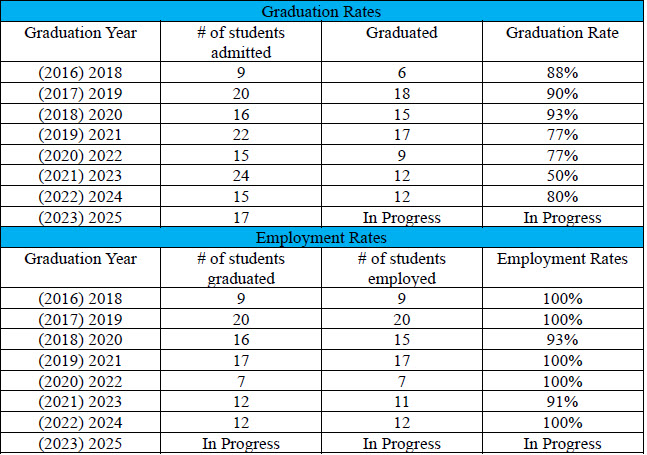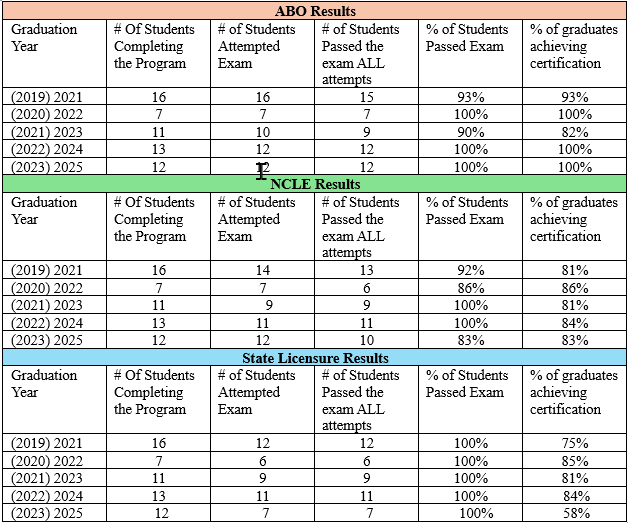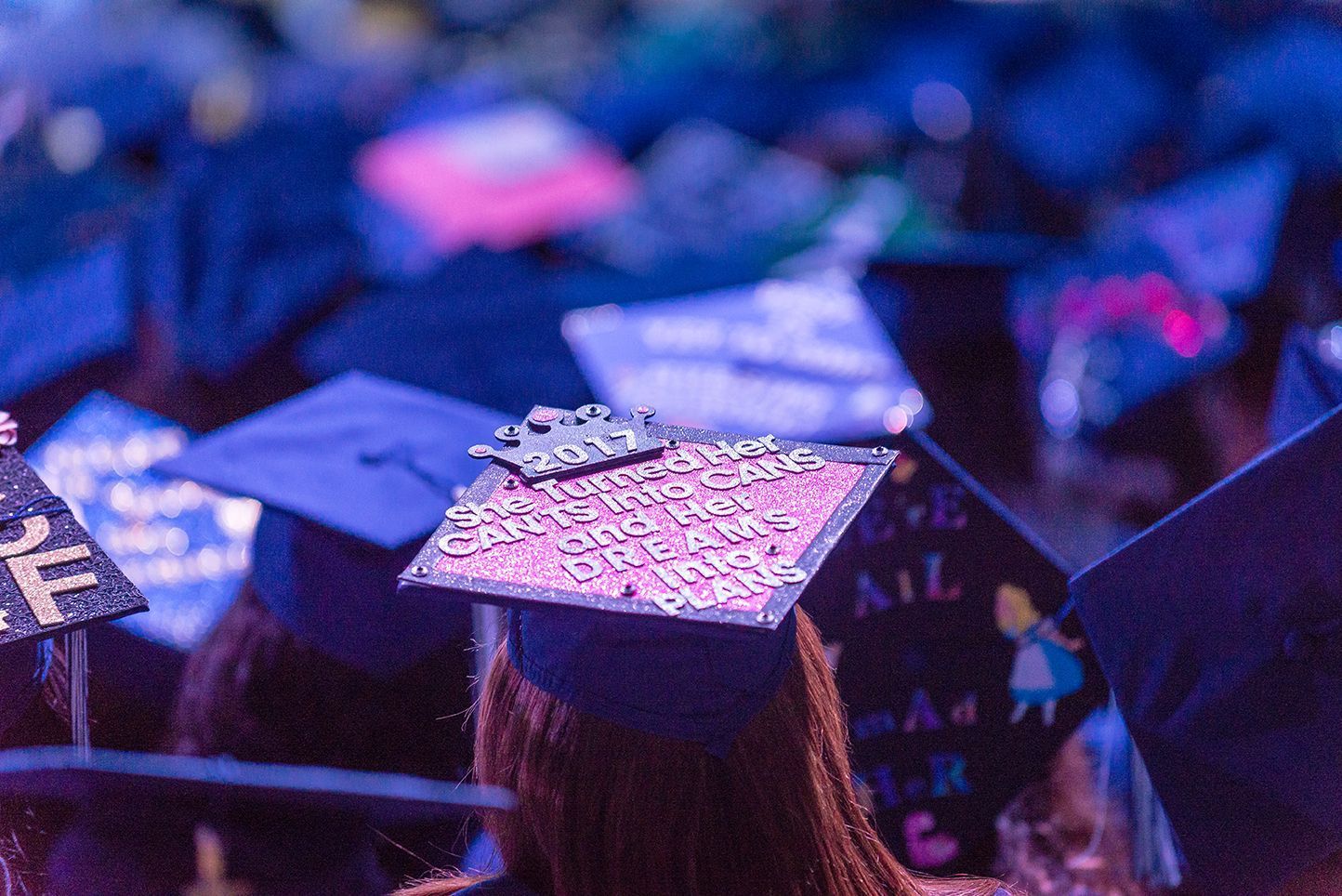Vision Care Technician/Opticianry
Associate of Science
Accessibility Options: Skip to Content Skip to Search Skip to Footer Institutional Accessibility Open Alternative Formats for this page
Accessibility Options: Skip to Content Skip to Search Skip to Footer Institutional Accessibility Open Alternative Formats for this page
Associate of Science
During COVID-19, most clinical affiliates mandated vaccinations for all students attending clinical externships at off-campus sites. This was a clinical affiliate requirement and not a Broward College requirement, and declining the COVID-19 vaccination prevented students from completing their program of study. At this time, clinical affiliates do not have mandatory COVID-19 vaccination requirements. Clinical affiliates currently mandate the Flu vaccine and could reinstate the COVID-19 vaccination requirements at any time and if so, students will be required to have the COVID-19 vaccination to attend clinical rotations, allowing them to progress in their program of study.
Broward College's Vision Care Program offers an Associate of Science (A.S.) degree that provides you with the training needed to assist in the ocular health of patients. This program simultaneously prepares you to work with optometrists, ophthalmologists, and eye care corporations as an optician.
Associate of Science degree in Vision Care
The curriculum of this program has been designed to train the student in the laboratory techniques of measuring, grinding, fitting, and adapting to eyewear, and preliminary examination pre-testing evaluation.
Broward College Mission Statement
The mission of Broward College is Transforming students lives and enriching our diverse community through academic excellence, innovation, and meaningful career opportunities. As a public community college accredited to offer associate degrees, selected bachelor's degrees, and certificate programs, the institution and its District Board of Trustees are committed to fostering a learning-centered community that celebrates diversity and inclusion by empowering and engaging students, faculty, and staff.
Vision Care Program Mission Statement
The mission of the Vision Care Technology/Opticianry Program is to prepare competent, ethical, and culturally sensitive entry-level vision care professionals who are dedicated to lifelong self-directed learning. The program is committed to preparing professionals who are capable of functioning in a dynamic and ever-changing area of healthcare delivery. The Vision Care Technology/Opticianry Program exists to provide technical and professional education to benefit all segments of the community. The Program is committed to quality instruction delivered by dedicated faculty who are engaged in continued professional development.
AS in Vision Care
Seats are still available for the August 2026 Fall term and applications are still being accepted
August 2026 Application Criteria:
Application Period: January 8- June 29
Admission Selection Criteria:
Selected candidates must have a minimum overall GPA of 2.0
Selection for admission is based on a Point system. Students with the highest points will be admitted first until all seats are filled. If a tiebreaker is needed, admission will be based on the highest GPA.
Before admission, each student is required to successfully complete a drug screening. Please be advised that certain over-the-counter supplements and alternative medicinal products, including but not limited to CBD, THC, Cannabinoid, and Cannabinoid Oil may trigger a positive result, and consequently, the student will not be able to be admitted to the Health Science program. A second drug-tested sample is not allowed per Broward College Admissions Procedure A6Hx2-5.01. The links are provided below. Admissions Policy (PDF) | Admissions Procedure (PDF)
Overall GPA (Max 4) Points given
4.00 to 3.50 - 4 points
3.49 to 3.00 - 3 points
2.99 to 2.50 - 2 points
2.49 to 2.00 - 1 point
Grades Earned in Prerequisite Courses (Maximum 24)
| Course | Grade A | Grade B | Grade C |
|---|---|---|---|
| MGF1106 or MAC1105 | 5 | 4 | 3 |
| POS2041 or AMH2020 only | 5 | 4 | 3 |
| BSC1005 | 5 | 4 | 3 |
| ENC1101 | 3 | 2 | 1 |
| CGS1060C | 3 | 2 | 1 |
| SPC1608 or SPC1024 | 3 | 2 | 1 |
Prior Educational Experience (Maximum 3 points)
MA/MS Degree - 3 points
BA/BS Degree - 2 points
AA/AS Degree - 1 point
Military Service (Maximum 5 points)
(5 points will be awarded to US Armed Forces active duty and honorably discharged veterans.)
Max Points awarded for program admissions (36).
Currency of Prerequisite Coursework
Beginning with the application periods for the May, June and August 2026 cohorts: All applicants to the Health Science programs must have successfully completed the required mathematics and science prerequisite courses within the ten (10) years preceding the application submission date. This policy ensures that students enter the program with up-to-date knowledge essential for success in the current curriculum.
Applicants who have completed prerequisite coursework more than ten years prior to the application date are required to retake the relevant courses to meet this requirement. If the science and math courses are older than 10 years, please see an academic advisor to determine eligibility to retake the courses at Broward College. Exceptions to this policy are not permitted.
Additional Information:
For the August 2022 Vision Care program, students who were admitted earned between 2 and 15 points and had GPAs of 2.0 to 4.0.
In Health Science programs, a retracker is a student whose progression has been interrupted because of course failure, withdrawal, or personal circumstances and who is later approved to re-enter the program in a future term.
Students seeking to retrack into the Health Science programs must adhere to the following guidelines:
2. Approval Process
3. Limitations
Our curriculum offers learners a theoretical approach to important ophthalmic concepts. The program's curriculum is composed of didactic (lecture) followed by directed clinical training at our college's on-site clinic, as well as off-site affiliated ophthalmic practices.
Due to our small class sizes, we can ensure individualized attention for all Vision Care Opticianry students. The clinic offers state-of-the-art equipment and the latest technology for our students.
If you are considering enrollment in the Vision Care Program, you should be able to:
Once you complete the program, you will be expected to:
RSVP for our monthly Live Virtual Information Sessions to learn more.
Employment in this occupation is expected to increase as demand grows for corrective lenses. The number of middle-aged and elderly persons is projected to increase rapidly. Middle age is a time when many individuals use corrective lenses for the first time, and elderly persons require more visual care.
The Optician (LDO) plays a vital role in fitting and adapting corrective lenses and other optical devices to aid vision. They fit eyeglasses and contact lenses for patients, perform diagnostic testing, and can operate as independent practitioners.
Our graduates have an excellent pass rate on the ABO, NCLE, and State Board examinations, and 100 percent of our graduates have found work in the field or have chosen to pursue a higher
| Student |
|
|---|---|
| Faculty |
|
| Program |
|
| Environmental Compliance |
|
he program mission and goals are reviewed by the faculty, administrators, members of the advisory committee, and students on an annual basis or as needed.
The following tables indicate how many Broward College Vision Care Opticianry students found jobs, graduated, passed national certifications, and state board exams through 2024


| Communication Objectives |
|
|---|---|
| Technical Objectives |
|
| Cultural Objectives |
|
| Behavior and Conduct Objectives |
|
Graduates of the Broward College Opticianry Program must demonstrate the following competencies :
Within 18 months after enrolling, you can earn an Associate of Science degree in Vision Care, which is a total of 72 credits. Whether you choose to follow the Optician track or the Ophthalmic Technician track, you will need to commit yourself full-time to the program.
The technical courses are offered at the BC North Campus in Coconut Creek. Clinic courses are offered at various sites throughout Broward County, along with the Vision Care Clinic on North Campus. General academic courses may be taken at any BC campus.
Licensure
Graduates must apply to take the American Board of the Opticianry and the National Contact Lens Certification Examinations to be eligible to become licensed in the State of Florida. Graduates must also apply to take the State of Florida Department of Health Board of Opticianry Examination required to practice as an Optician in Florida.
Florida Board of Opticianry
4052 Bald Cypress Way, Bin # C08
Tallahassee, FL 32399 -3258
Phone: 1-850-488-0595
Phone: 1-850-245-4474
Fax: 1-850-921-5389
floridasopticianry.gov
American Board of Opticianry
National Contact Lens Examiners
6506 Loisdale Rd. Suite 209
Springfield, VA 22150
Phone: 1-800-296-1379
Office: 1-703-719-5800
www.abo-ncle.org

Vision Care Faculty are all Florida Licensed Opticians or Optometrists
Dr. Nina Mckie, L.D.O, DHSc- Professor / Program Manager
Dr. Amy Reese, O.D- Clinical Doctor
Dr. Steven Friedfeld, O.D Clinical Doctor
Mr. Lloyd Holness, L.D.O, M.A- Professor
Mr. Brett Weintraub, L.D.O- Adjunct Instructor
Program Director
Nina Mckie
mmckie@broward.edu
Health Science Coordinator
Marianne Letcher
mletcher@broward.edu
Health Science Advisor
Rehana Saleem
rsalee1@broward.edu
RSVP for our monthly Virtual Information Sessions to learn more.
BROWARD COLLEGE SACSCOC ACCREDITATION STATEMENT
Broward College is accredited by the Southern Association of Colleges and Schools Commission on Colleges (SACSCOC) to award Associate in Arts, Associate in Science, Associate in Applied Science, Bachelor of Science, and Bachelor of Applied Science degrees. Broward College also may offer credentials such as certificates and diplomas at approved degree levels. Questions about the accreditation of Broward College may be directed in writing to the Southern Association of Colleges and Schools Commission on Colleges at 1866 Southern Lane, Decatur, GA 30033-4097, by calling 404-679-4500, or by using information available on SACSCOC's website (www.sacscoc.org).
The program is accredited by:
Commission on Opticianry Accreditation (COA)
PO Box 592
Canton NY, 13617
Email: director@coaaccreditiation.com
Phone: 703-468-0566
Phase: Accredited
Status: Accredited to February 26, 2024
The Vision Clinic provides high-quality, affordable vision care to Broward College students, faculty, and members of the community. Our licensed professionals offer comprehensive exams, frame and lens fittings, and contact lens services in a clinical, patient-focused environment.
Broward College Health Science Admissions staff may be contacted by email at healthscience@broward.edu.
North Campus
Building 46 | Room 252
1000 Coconut Creek Blvd.
Coconut Creek, FL 33066
Central Campus
Building 8 | Room 130
3501 Davie Road
Davie, FL 33314

Applying for aid is not difficult, but the application does take some focused time. The rewards are worth it. These funds can change your life.

Unlike loans, you do not have to pay scholarship money back. Broward College has limited scholarships for merit, financial need, degree choice, and more.
Get Started Today
A BC degree checks all the boxes. If this program is your goal, get started toward becoming a student today.
This site is best viewed in a modern browser and is not compatible with Internet Explorer (IE). Please use another browser, such Chrome, Safari, Edge, or Firefox for the best user experience.